History has been shaped by crossings. Traveling by boat along the shore can be paralleled overland on foot, but for most of human history, reaching distant, even unseen lands has required boats and navigators willing to set a perpendicular course that leaves familiar land behind. Erik the Red in the 10th century and Columbus in the 15th sailed west into the unknown Atlantic to discover the New World. Australia and the Pacific islands were settled in vessels launched from Asia. In recent times, crossings in small boats have been personal challenges. Frank Samuelsen and George Harbo were, in 1896, the first to cross the Atlantic under oar power. Ed Gillet paddled a kayak across the Pacific from California to Hawaii in 1987.
I made my first crossing in 1965, when I was 12 years old, and while it didn’t shape history, it shaped me. I had bought a flat-bottomed skiff from a kid who lived a block away from the home in Edmonds, Washington, where I grew up. I paid $15 for it, a few weeks’ worth of my allowance. I don’t know who built the boat, probably some penny-pinching amateur, because the plywood that made up the hull was textured and meant for house siding. The boat was too heavy for me to cart the half mile from home to the shore of Puget Sound, let alone drag over busy railroad tracks to get to the beach, so Dad let me keep the boat at the Edmonds marina alongside his 27’ Tumlaren sloop. He also let me use his 5-1/2 hp Johnson SeaHorse outboard on one condition: I had to stay close to shore.
The marina was a 2-mile bike ride from home, and during the summer I often went out boating, by myself, along the Edmonds shore. I’d leave my bike on the dock, get the gas tank, oars, life vest, and throw-cushion out of the cabin, and load up the skiff. I had rigged the motor to be steered by means of a plastic-covered wire clothesline that I’d looped through pulleys around the perimeter of the cockpit so I could sit forward to bring the bow down.
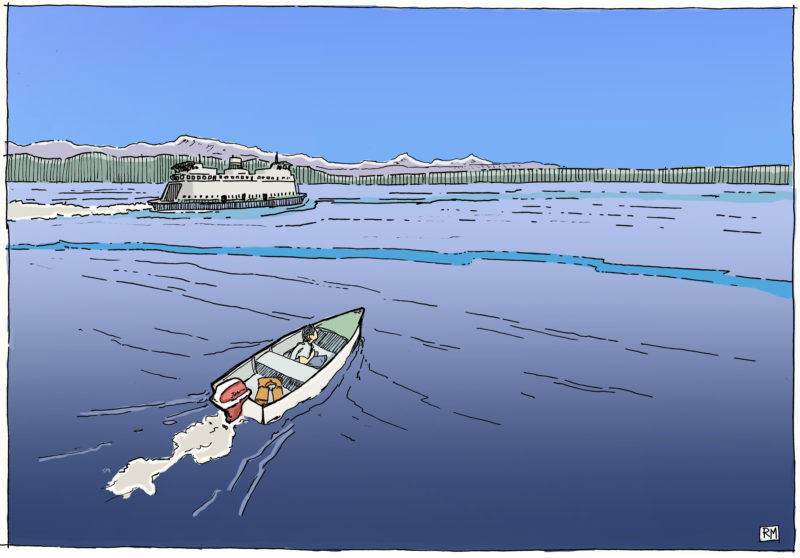 Rick Myers/rickmyersart.com
Rick Myers/rickmyersart.com.
One bright sunny day, when Puget Sound was drowsing in a silvery calm, I biked to the marina, fired up the outboard, and motored out from behind the boulder breakwater. In the cool air, the Kingston shore, 5 miles to the west, was sharply defined and seemed much closer than it usually did through a scrim of midsummer haze. I turned west and aimed the bow at the Kingston ferry dock. After I set the throttle at a comfortable cruising speed, I stepped forward and sat in the bottom of the boat with my legs tucked under the foredeck and my back resting against the thwart. The steering line, running along the beam supporting the deck, was at shoulder level and only occasionally needed tending. The air coming over the bow cooled my face, but the still air in the cockpit let the warmth of the sun come through. In the middle of the Sound, a ferry on its way from Edmonds passed me, and passengers lining the railing on the upper deck waved and I waved back. In 1965, apparently, seeing a recently graduated sixth-grader alone in a small boat in the middle of Puget Sound wasn’t cause for alarm, and there were neither cell phones nor 911 anyway.
As I neared Kingston I steered for a narrow sandy beach just yards to the north of the ferry dock. I killed the motor, kicked it up, and used an oar to pole across the shallows to the beach. With my weight in the stern and the bow lifted above the water, the boat skidded ashore. I crawled over the foredeck and set foot on dry land.
I didn’t stay—touching that far shore was all I’d set out to do—and shoved off straightaway to head back home. At the halfway point, the sky had pushed the land around me tight against the horizon. I could barely make out individual buildings on either shore, so certainly no one could see me. I was miles from anything and anyone and on my own in a way that I had never been before.
I didn’t tell my father about that crossing until I was in my mid-40s. He wasn’t at all surprised that I had broken our agreement and ventured far from Edmonds; he had expected it. He’d been a boater his whole life and he knew the lure of a distant shore, and, as a father, he knew that one day I would have to sail away from the security of my home shore and the timidity of always doing as I was told.![]()


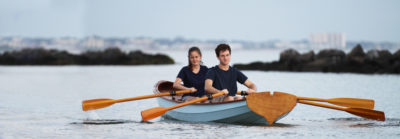


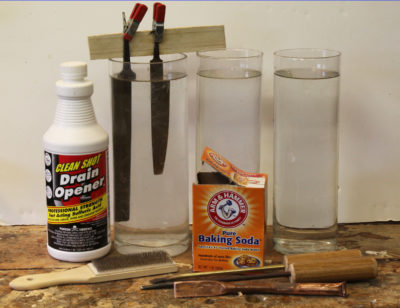

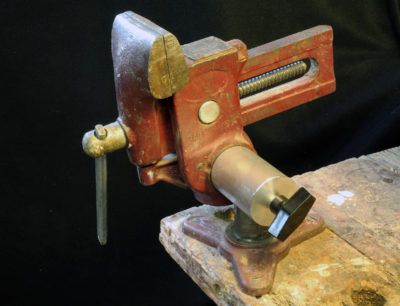
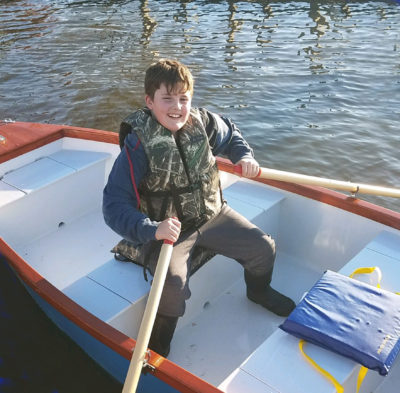
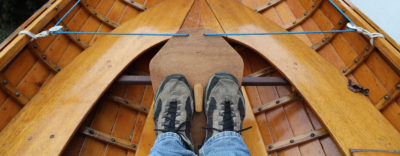
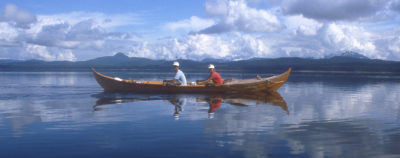
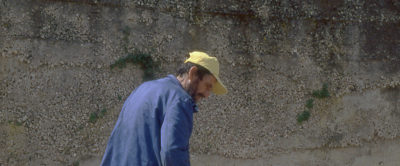
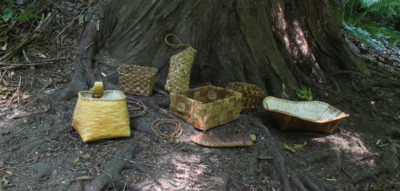
Nice story, Chris. We grew up in a world quite different from today’s world. My childhood home was on the bank of the Kennebec River in coastal Maine, and while I shared similar experiences, I was not lucky enough to have a father like yours. Nevertheless, those small travels on the river and in the forests along the river shaped me, too. thanks for sharing that one.
Michael Colfer
Thanks, Chris. Men are made from such timely steps.
Rick Meyers’ illustration reminded me of my grandfather’s outboard. Grandpa never owned a boat but every summer he’d haul his Johnson 5-horse to “the Lake” where our family vacationed. A friend loaned Grandpa his fishing boat and we were all treated to trout-fishing trips and diving off “the Rock” and slow tours around the lake with Grandpa at the throttle. The big moment came for my older brothers and me when we rowed the boat back to the owner’s camp. Even though our time at the lake was over, we got to spend fifteen minutes more on the water, masters of our own, youthful fates. Seeds were sown then that still grow today.
Just Magical, Chris. It brings back memories of my childhood exploring the Essex rivers in the UK.
Always wanting to see what was around the next bend in the river!
And mine too, of childhood holidays exploring the Kingsbridge estuary in Devon, UK.
Well written. Good read with a cup of Joe.
Built a raft with slab lumber from the North Amherst, Massachusetts, mill with classmate Dale one of the ’50s summers when the town pool was closed—polio days. We launched it in the Mill River upstream from the meadow where we practiced cooking, orienteering, river crossing (monkey bridge), and messing around as Boy Scouts Not only was the lumber green, the water line was about 3″ above the raft’s deck.
But it was grand and your tale rings up wonderful memories, as did Huck Finn—over and over. Today’s 5-mile crossings are Lincoln Park to the west side of Blake Island (Puget Sound, Washington) in our Pygmy yaks. The illustrations echo Hergé’s wonderful Tintin series. And the grandkids’ appetite for adventure grows stronger.
Thanks for the fine work with SBM. Makes up for the loss of Sea Kayaker.
[SBM‘s editor, Christopher Cunningham, was the editor of Sea Kayaker magazine from 1989 to its closing in 2014. Ed.]
Enjoyed your story, Chris. Reminds me of the first boating adventure I took after building my first boat: a good little 13′ skiff (Culler design). Rowed out to a tiny, uninhabited island off Kittery, Maine, and I felt really proud of myself. Walked to the ocean side of the island and saw a young man my age going by in a Whitehall under sail in the open ocean. We waved and I felt both diminished and inspired at the same time!
“…the timidity of always doing as I was told.”
We didn’t live that close to the bay but had many sizable lakes in our area when growing up. I love the water and was ready at a moment’s notice when dad planed a fishing trip. The kids and I swam in as many of those lakes as we could get to on our bikes. One summer day, I decided to swim across the lake. Being kidney-shaped, it took as long to bike around (either direction) as it did to swim directly across. I passed no one on the lake that day, never mentioned it to my parents. I went to bed early that evening and slept late the next day.
My “crossing” was when my uncle launched me in his 1969 Sterncraft Tri Hull with a 160 MerCruiser inboard-outboard on Lake Sam Rayburn, East Texas. He took the trailer back to the campsite and I made my way around a few points to find the right bit of shoreline. I didn’t need to move to balance the boat, it had power trim, which I forgot to use, so I cruised in a little bow high.
He was an great teacher, I am impressed to this day of how he had a trailer hitch on the front of his Ford 250 with a cabover camper. He’d launch the boat with it hooked to the front bumper, then drive it all the way back to the campsite that way.
Thanks for sharing your story, Chris.
Cheers
Kent